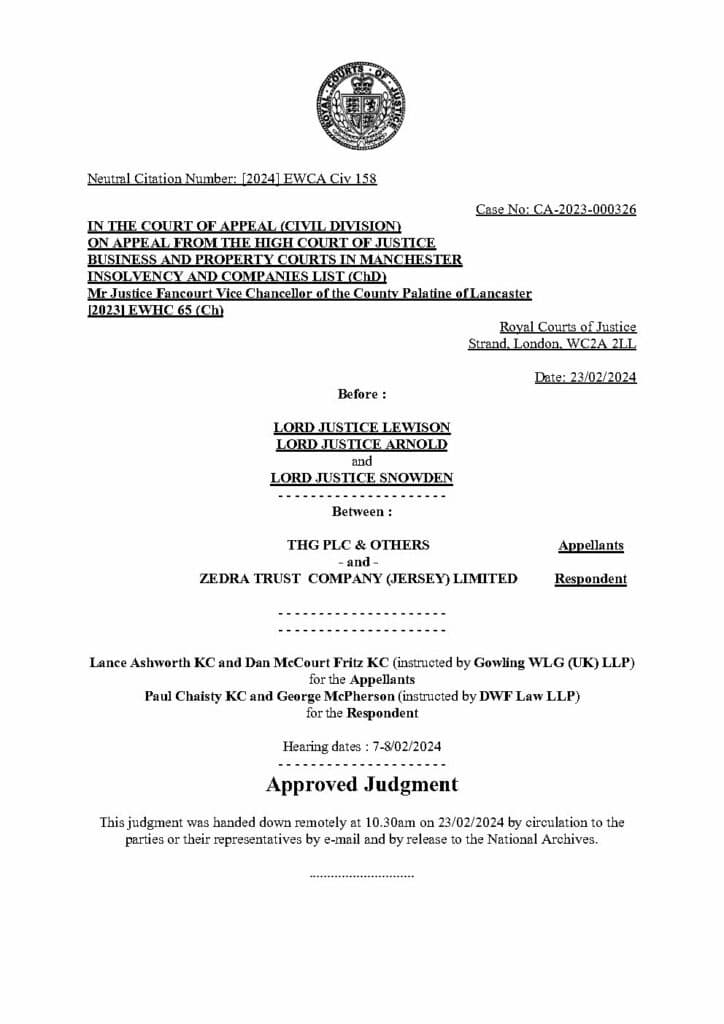In a landmark decision, the Court of Appeal overturned decades of legal precedent regarding the limitation period for unfair prejudice petitions. The ruling in THG Plc v Zedra Trust Company (Jersey) Ltd [2024] EWCA Civ 158 casts aside the long-held rule that such petitions were exempt from statutory limitation.
Limitation Period for Section 994 Petitions
For 40 years, the legal consensus held that unfair prejudice petitions, governed by section 994 of the Companies Act 2006, were not subject to any statutory limitation period. This belief was reinforced by judicial decisions, academic commentary, and even two Law Commission Reports. However, the recent decision by the Court of Appeal has upended established legal principles.
What is an unfair prejudice claim (a s.994 petition)?
An unfair prejudice claim is a legal recourse granted to shareholders under the Companies Act 2006, specifically outlined in sections 994 to 999. These claims, commonly known as section 994 petitions, are initiated through a court petition process; a petition is a legal document formally requesting a court order and setting out the petitioner’s version of the facts at issue.
The section 994 petition is the main procedural avenue for minority shareholders to seek redress from the court in cases of perceived ‘unfairly prejudicial’ behaviour by the majority shareholders.
Unfair prejudice occurs when the conduct in question violates the reasonable expectations of the petitioner. This may involve breaches of the petitioner’s legitimate expectations, contractual rights, or established practices within the company.
Court of Appeal’s Ruling
The Court of Appeal’s decision in THG Plc v Zedra Trust Company (Jersey) Ltd [2024] EWCA Civ 158 rested on the interpretation of statutory law and precedent.
Contrary to previous assumptions, the court held that unfair prejudice petitions fall within the scope of statutory limitation. Citing section 8 of the Limitation Act 1980, the court determined that such petitions are considered “an action upon a specialty,” thereby subjecting them to a limitation period of 12 years.
Limitation Periods
A limitation period is the period of time within which a party to a contract or a party who has suffered damages as a result of another party’s conduct, must bring a claim.
The Limitation Act 1980 sets out the applicable time limits depending on the type of claim being made. It is important to be aware of these time limits if you are bringing or defending a claim.
LIMITATION ACT 1980 – WARNING
The Limitation Act 1980 sets out strict statutory deadlines within which you must bring litigation claims. Your legal rights will become irreversibly time-barred if you fail to take legal action (or defend a claim on time). Therefore, you should seek specific legal advice about your legal dispute at the very first opportunity so that you understand the time you have left. Failure to take advice or delay in taking action can be fatal to your prospects of success.
Please note that for regulatory reasons we do not offer any free advice.
Implications of Court of Appeal’s Decision
The implications of this ruling are significant for practitioners in this area of law. It necessitates a reassessment of how unfair prejudice petitions are pursued and the relief sought by petitioners. Additionally, the decision introduces several anomalies, such as the classification of certain claims under section 9 of the Limitation Act and the applicability of section 32 to postpone the running of time.
Download the Judgment Here
Section 996 Companies Act 2006
Section 996 of the Companies Act 2006 grants the court broad discretionary powers to remedy unfair prejudice. Remedies may include the alteration of the company’s constitution, the regulation of the company’s affairs, or even the purchase of shares by the company or its shareholders. The court’s discretion is exercised judiciously, considering the specific circumstances of each case.
The law relating to the ability of a member to bring proceedings on behalf of the company is not written down in statute. The general principle – commonly known as the rule in Foss v Harbottle – is that it is for the company itself to bring proceedings where a wrong has been done to the company. However, where there has been conduct amounting to a “fraud on the minority”, an exception may be made to the rule, so that a minority shareholder may bring an action to enforce the company’s rights.
Identifying Petitioners and Members
Unfair prejudice claims can be initiated by members of the company, but clarity is essential on who qualifies as a “member” for this purpose. A member may include shareholders, subscribers to the memorandum, and those who have agreed to become members. Distinguishing between registered members and beneficial owners is critical.
Decoding “Prejudice” and “Unfairness”
To comprehend the essence of unfair prejudice, it’s crucial to dissect the terms “prejudice” and “unfairness.” Prejudice refers to harm, injury, or detriment suffered by a shareholder, often linked to their economic interests. Unfairness, in this context, denotes conduct that goes against the principles of justice and equity.
When can Shareholders start a claim for Unfair Prejudice:
Shareholders have the legal right to bring unfair prejudice claims before the court. This typically occurs in the following scenarios:
- Breach of Fiduciary Duty:
Shareholders can sue when majority shareholders or directors breach their fiduciary duties, prioritising personal interests over those of the company and minority shareholders. - Exclusion from Decision-Making:
If minority shareholders are systematically excluded from participating in crucial decisions that significantly impact the company, they may have grounds for an unfair prejudice claim. - Unjust Financial Dealings:
Unfair financial dealings, such as diverting profits to the detriment of minority shareholders, can be a basis for legal action.
How Section 994 Petitions Empower Minority Shareholders
Section 994 petitions represent a crucial avenue for minority shareholders to seek redress in cases of perceived unfair treatment within a company. By understanding the nuances of this legal mechanism and adhering to procedural requirements, aggrieved shareholders can effectively address instances of unfair prejudice and uphold their rights within the corporate realm.
Expert UK Shareholder Dispute Lawyers
LEXLAW specialise in navigating the intricate landscape of shareholder disputes and unfair prejudice claims. With a deep understanding of company law and extensive experience in handling complex legal matters, our team is dedicated to advocating for the rights of minority shareholders who have been subjected to unjust treatment.
From meticulously analysing the circumstances surrounding unfair financial dealings to crafting compelling section 994 petitions, we are committed to providing comprehensive legal assistance tailored to each client’s unique situation. Our goal is to empower our clients with the knowledge and resources needed to pursue effective legal remedies and secure favourable outcomes in their shareholder disputes. Trust our expertise to guide you through the complexities of the legal process and fight for the justice you deserve.
Instructing our Litigation Lawyers
LEXLAW provides the best possible outcome for our clients by conducting in depth investigation and research into the realistic prospects of a case before selecting the appropriate course of action in order to reduce time and expense.
Liability for costs is always an issue in litigation and based on our extensive litigation experience we provide our clients with as much strategic, practical as well as carefully considered legal advice in order to ensure minimum risk in respect of costs.
Where appropriate we encourage the use of alternative dispute resolution (such as mediation and without prejudice negotiation) and our lawyer’s negotiation skills are first class. If early settlement at advantageous terms is not possible, we are extremely experienced and capable at navigating our clients through the litigation process.
Check Your Litigation Case ✔
We analyse your case prospects. We deliver strategic legal advice at your first fixed fee meeting. We get optimal legal results. Want our opinion on your case? Click below or call our lawyers in London on ☎ 02071830529

